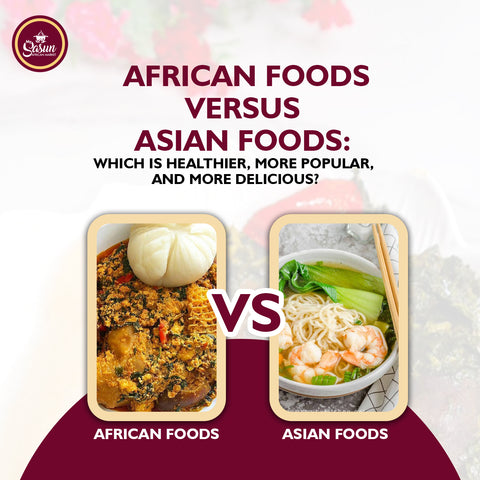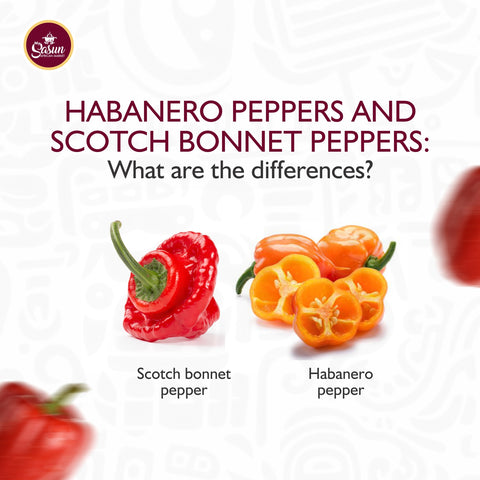There are lots of flavors and tastes around the whole world with African and Asian cuisines standing out as two of the most diverse and tantalizing. Each offers a unique blend of ingredients, cooking techniques, and cultural significance. But when it comes to health, popularity, and deliciousness, which cuisine takes the crown? In this blog post, we seek to do a comparison analysis to determine that. Stay plugged in!
Also Read: 13 African Foods That Can Help You Gain Weight Fast
Health Benefits of African and Asian Foods
African Foods:
African cuisine is rich in whole grains, vegetables, lean proteins, and healthy fats. Dishes like Ethiopian injera, made from teff flour, are high in fiber and essential nutrients. Leafy greens, beans, and nuts commonly found in African diets provide a wealth of vitamins and minerals.
Asian Foods:

Asian cuisine emphasizes balance and variety, featuring plenty of vegetables, lean proteins, and healthy fats. Staple foods like rice, tofu, and seaweed are low in calories but high in essential nutrients. Japanese and Mediterranean diets, which share similarities with many Asian diets, are often hailed for their health benefits and longevity-promoting properties.
Also Read: 15 Porridges and Puddings from the Heart of Africa
Cooking Methods of African and Asian Foods
African Cooking Methods:

Traditional African cooking methods such as stewing, boiling, and grilling preserve the nutritional integrity of foods. Fermented foods like kimchi and injera also offer probiotic benefits, promoting gut health.
Asian Cooking Methods:

Asian cooking often involves stir-frying, steaming, and poaching, which help retain nutrients. The use of minimal oil and quick cooking times in methods like stir-frying helps maintain the health benefits of fresh vegetables and proteins.
Global Popularity of African and Asian Foods
African Foods:
African cuisine is gaining international recognition, with dishes like jollof rice, bobotie, and injera appearing in restaurants around the world. The vibrant flavors and unique ingredients are being embraced by food enthusiasts everywhere.
Asian Foods:
Asian cuisine has long been popular worldwide, with dishes like sushi, pad Thai, and curry becoming household names. The emphasis on fresh, healthy ingredients and balanced flavors continues to attract a global audience.
Cultural Influences of African and Asian Foods
African Cuisine:

The global appreciation for African cuisine is on the rise, with African food festivals, cooking shows, and restaurants popping up in major cities. The rich cultural heritage and storytelling through food are drawing international interest.
Asian Cuisine:

Asian cuisine has a well-established global presence, with numerous Asian restaurants and markets available worldwide. Asian cooking techniques and ingredients have seamlessly integrated into various international culinary traditions.
Also Read: The Nutritional Benefits of Okra
Taste and Flavor: African vs. Asian Foods
Taste of African Cuisine:
African foods are known for their bold, earthy flavors, often achieved through the use of rich spices and herbs. Dishes like Moroccan tagine and Nigerian egusi soup are celebrated for their depth and complexity.
Taste of Asian Cuisine:
Asian cuisine offers a harmonious blend of sweet, sour, salty, bitter, and umami flavors. The balance of these tastes in dishes like Thai green curry and Chinese Peking duck makes Asian cuisine incredibly satisfying and delicious.
Signature Dishes
African Delights:

- Jollof Rice: A West African staple, this spicy rice dish is cooked with tomatoes, onions, and a variety of spices, often served with meat or fish.
- Ethiopian Doro Wat: A flavorful chicken stew spiced with berbere and served with injera.
- South African Bobotie: A spiced minced meat dish topped with an egg custard, offering a unique blend of sweet and savory flavors.
Asian Favorites:
- Sushi: This Japanese dish combines vinegared rice with fresh seafood, vegetables, and sometimes tropical fruits.
- Pad Thai: A Thai stir-fried noodle dish featuring tamarind paste, fish sauce, peanuts, and lime.
- Indian Butter Chicken: A rich, creamy curry with tender chicken pieces simmered in a tomato-based sauce.
Comparative Analysis: Health, Popularity, and Deliciousness

Which is Healthier?
Both African and Asian cuisines offer health benefits, but their approaches differ. African foods are nutrient-dense, focusing on whole grains, legumes, and leafy greens, which are excellent for heart health and digestion. Asian diets, particularly those from Japan and the Mediterranean-influenced regions, emphasize balance and portion control, contributing to longevity and overall wellness. In terms of specific health benefits, Asian foods might edge out slightly due to their emphasis on low-fat cooking methods and high consumption of vegetables and seafood.
Which is More Popular?
Asian cuisine is undeniably more popular on a global scale, with its presence firmly established in every major city. Sushi, Chinese takeout, and Indian curry are universally recognized and loved. African cuisine, while growing in popularity, still has some catching up to do. However, the increasing interest in African food suggests that its popularity will continue to rise.
Which is More Delicious?
Deliciousness is subjective and depends on personal taste preferences. African foods are celebrated for their hearty, robust flavors, often appealing to those who enjoy spicy and richly spiced dishes. Asian foods, with their delicate balance of flavors and variety, appeal to those who appreciate culinary harmony and freshness. Ultimately, both cuisines offer delicious options, and the "winner" in terms of taste will vary from person to person.
Also Read: African Condiments and where to find them in the US and Canada
FAQs
What makes African cuisine unique?
African cuisine is unique due to its bold flavors, use of indigenous ingredients, and diverse regional dishes. Each region has its own distinct culinary traditions, making African food incredibly varied and flavorful.
How does the popularity of African and Asian foods compare?
Asian food is more globally popular, with widespread recognition and availability. However, African cuisine is rapidly gaining international interest and appreciation.
Are African foods healthier than Asian foods?
Both African and Asian foods offer health benefits. African foods are rich in whole grains and vegetables, while Asian foods emphasize balance and fresh ingredients. The healthiness of either cuisine depends on the specific dishes and ingredients used.

What are some popular African dishes?
Popular African dishes include jollof rice, injera with doro wat, and South African bobotie. These dishes are known for their rich flavors and cultural significance.
How do the cooking techniques of African and Asian cuisines differ?
African cooking often involves stewing, boiling, and grilling, while Asian cooking frequently uses stir-frying, steaming, and poaching. Both cuisines also incorporate fermentation in various ways.
Can African and Asian cuisines be fused together?
Yes, fusion cuisine blending African and Asian flavors is becoming increasingly popular. Dishes like stir-fried vegetables with African spices or sushi rolls with African-inspired fillings showcase the versatility and creativity of combining these culinary traditions.
Also Read: Ponmo: All you need to know about this Nigerian Delicacy

Conclusion
Comparing African and Asian foods is like comparing two magnificent artworks; each is unique and beautiful in its own way. African cuisine is celebrated for its bold, hearty flavors and cultural richness, while Asian cuisine is renowned for its balance, variety, and global appeal. Both offer exceptional health benefits, delicious taste experiences, and growing popularity. Whether you prefer the robust flavors of African dishes or the harmonious tastes of Asian cuisine, there's no denying that both culinary traditions have much to offer. Explore, taste, and enjoy the best of both worlds!









Comments (5)
I would never have believed that cold sore herpes virus can be cured with ancient herbal medicine because I just tested negative for the second time since I finished drinking the medicine a herbal doctor sent to me, all the sores and blisters were gone immediately I started drinking the herbal meds, so I want you all to know that herpes virus can be cured with the right use of ancient herbal medicine so visit this herbalist called doctor excel on his Email: drahonsie00@gmail.com / WhatsApp: +2348039482367. https://drahonsie002.wixsite.com/dr-ahonsie https://www.facebook.com/drstellaherbalhome?mibextid=ZbWKwLThanks
Hello everyone, i have a very important information about herpes virus, i was a victim of hsv1&2 until i met doctor Ahonsie, it still feels like a dream to me. it has been two years now, i have not experience any breakout of herpes. I new about him through a post made on social media, a lady shares her experience and then i decided to contact him and ever since i contacted i was encourage and with no doubt i was cured from herpes simplex in just two weeks. He also treat other illnesses like HPV, HIV, CANCER, THYRIOD, PENIS ENLARGEMENT, and more contact him via Email: drahonsie00@gmail.com / WhatsApp: +2348039482367. https://drahonsie002.wixsite.com/dr-ahonsie https://www.facebook.com/drstellaherbalhome?mibextid=ZbWKwLThanks
I thought the physicians says there is no cure for HSV 2!!! I am telling you today that Dr ahonsie cure HSV 2 with his herbal medicine and once you get cured you are cured forever it is never reversible, I have been suffering for this deadly disease called h HSV 2 for more than a 2years and lost all hope because my doctor says there is no cure for HSV 2. Brethren I saw a testimony on the internet on how Dr ahonsie cure HSV, Hapatitis etc with his herbal medication and an email and watsapp to contact him was also displayed, I thought this was joke but I decided to contact him and he replied telling me not to worry that my problem is over . Dr ahonsie sent me a herbal medication to drink for one month but only 2weeks I feel strange and I went to my doctor and he confirmed me negative. He can help you too. Contact him drahonsie00@gmail.com or whatsapp +2348039482367 https://drahonsie002.wixsite.com/dr-ahonsie https://www.facebook.com/drstellaherbalhome?mibextid=ZbWKwL
My purpose out here today is to share this article to the world about how Doctor Odunga helped me in getting back my EX-boyfriend who broke up with me 4 months ago. I tried all I could to make him see reasons with me so that we can continue our relationship but he denied me. Thank God for giving me the thought of going into the internet for help, I searched properly and I saw different reviews of Doctor Odunga and I insisted on giving it a try by contacting him via what’s app on (+2348167159012). He gave me reason to live again and he prepared a spell and told me that my Ex-boyfriend will come back to me within 11 hours. Can you believe it, my EX-boyfriend came back to me, proposed to me and our wedding will be held soon. Contact him now!!! if you need any help. Email: odungaspelltemple@gmail.com and he does a lot of spells. Once again i want to say am very grateful for your help
Am really grateful and thankful for what Dr Ahonsie has done for me and my family. I Was having HERPES for good three years with no solution, the diseases almost took my life and because I was unable to work and I was also loosing lots of money .for medication, but one faithful day when I went online, I met lots of testimonies about this great man so I decided to give it a try and to God be the glory he did it. he cured me of my diseases and am so happy and so pleased to Write about him today. if you need his help or you also want to get cured just the way I got mine, just email him below drahonsie002@gmail.com You can also call or whatsApp his telephone number on +2348039482367. https://drahonsie002.wixsite.com/dr-ahonsie https://www.facebook.com/drstellaherbalhome?mibextid=ZbWKwLThanks once again Dr Ahonsie.